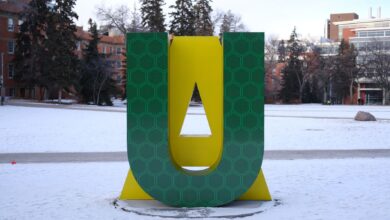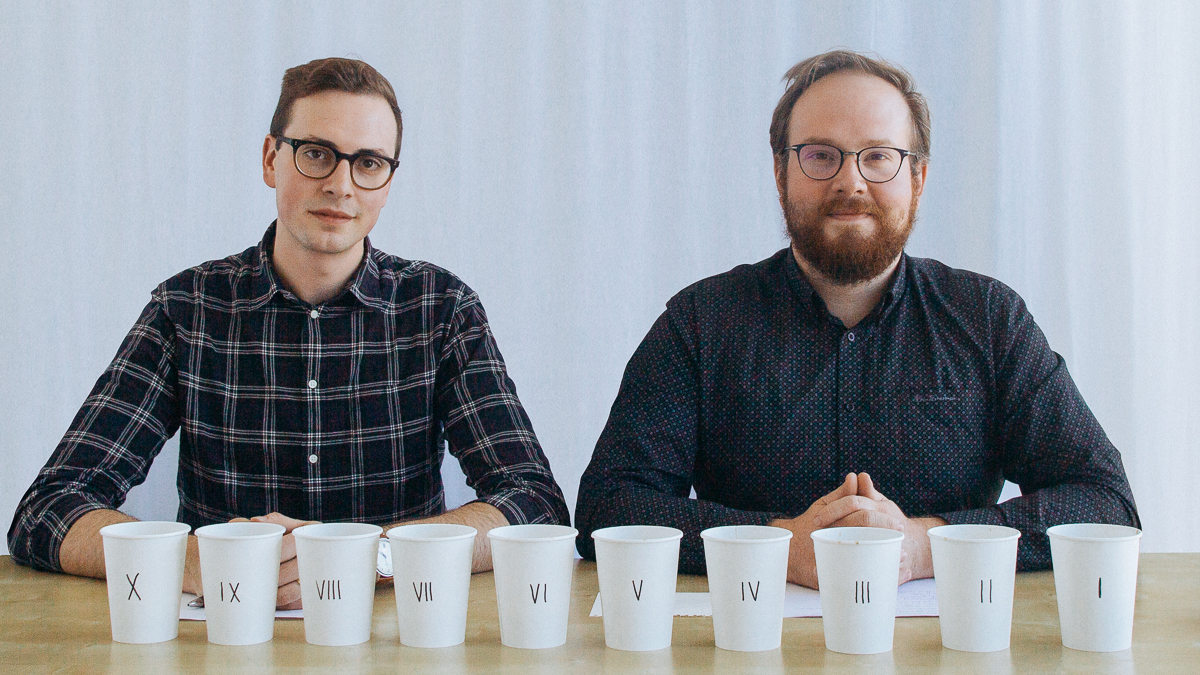 Rosty Soroka
Rosty SorokaThere are a few kinds of coffee drinkers at the U of A.
First, there are the coffee polygamists who look for spontaneity and avoid commitment. They rarely develop any strong feelings for a particular coffee and prefer to experiment — trying different roasts, different sugar-to-cream ratios. They had a regrettable fling with the sketchy vending-machine coffee at the University LRT station.
Second, there are the students who treat coffee as a sacred liturgy. Converted early in first year, they’ve remained faithful to one specific coffee. These coffee monogamists have memorized their favourite milk composites, artisanal foam structures, and preferred steamed-milk temperatures. They line up for 15 minutes and list out a memorized string of these specifications. Coffee experts Josh Hockin (pictured right) and Jordon Jeschke (pictured left) are here to help students navigate the coffee options available at the U of A — whether they’re part of the church of Tim Hortons or a coffee harlot.
Josh Hockin is the director of coffee at Transcend Coffee, the national coordinator of the Specialty Coffee Association, and Canada’s former representative in the World Barista Championships in 2011. Jordon Jeschke is a coffee trainer at Transcend Coffee and recently competed in the 2017 National Barista Championship of Canada. Hockin and Jeschke have done a blind coffee taste test, but instead of the carefully manicured coffee beans that they’re used to, the experts tasted eight coffees on campus. All of the coffees that Hockin and Jeschke tasted were medium roast, except for the Tim Hortons dark roast. Hockin and Jeschke also brought along two coffee blends roasted and brewed at Transcend Coffee on 109th Street. All coffees were poured into plain white cups and labeled with a number from one to 10. Besides reviewing the campus coffees, Hockin and Jeschke also tried to guess which was their own coffee among the coffee swill.
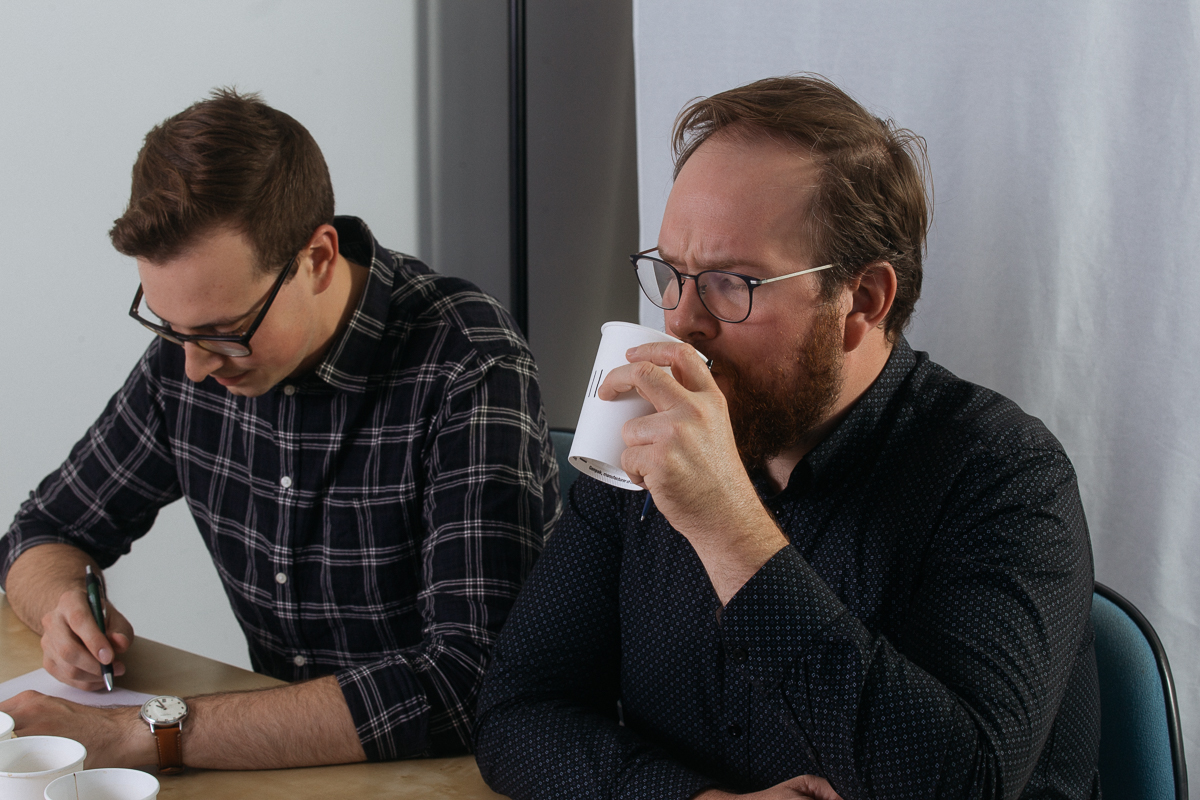
Tim Hortons Regular Roast ($1.69)
Hockin: This is pure garbage.
Jeschke: Yeah, I found it super thin, lifeless, weak.
Hockin: Brown water is what I got. It tasted like soggy cardboard.
Jeschke: My descriptions are not nearly as exciting. It’s among my least favourite on the table.
Hockin: This coffee is fucking terrible. I would guess that this is the thermos coffee (from Sweets and Treats).
Jeschke: I would guess maybe, Cookies by George? I don’t know, I’ve never had coffee from Cookies by George, but I just imagine it sitting out all day.
Transcend Kochere ($3.25)
Hockin: It’s really fruity. It smells to me like mandarin oranges, strawberries, and mangoes.
BOTH: (A lot of slurping.)
Hockin: It’s very sweet. It has nice acidity to it. Not sour, but if you compare dried fruit with fresh fruit — like a dried mango versus a fresh mango — you’ll see that a fresh mango has a brightness. That’s what we mean by coffee acidity. It tastes lively and fresh. It has a good balance, and that’s what this coffee tastes like.
Jeschke: Yeah, I also found it very fruity and bright and sweet. I think I know which one it is.
Hockin: Yeah, it’s the Transcend Kochere.
Tim Hortons Dark Roast ($1.69)
Hockin: There’s also quite a lot of bitterness in this coffee. A little bit more balance. There’s more going on in this coffee, then say, the first one for example. It’s not as one-dimensional. It’s quite dark.
Jeschke: I agree, I found it dark and bitter but it had some very clear nutty and chocolatey notes. It was very strong. I could see this being something people would love to put cream and sugar in, and it would still taste like coffee.
Hockin: Yeah, most people don’t drink strong coffee black, they drink strong coffee with milk and sugar.
Jeschke: I would maybe say Second Cup or Starbucks for this one, just because it is dark, but there are some discernible tasting notes in it.
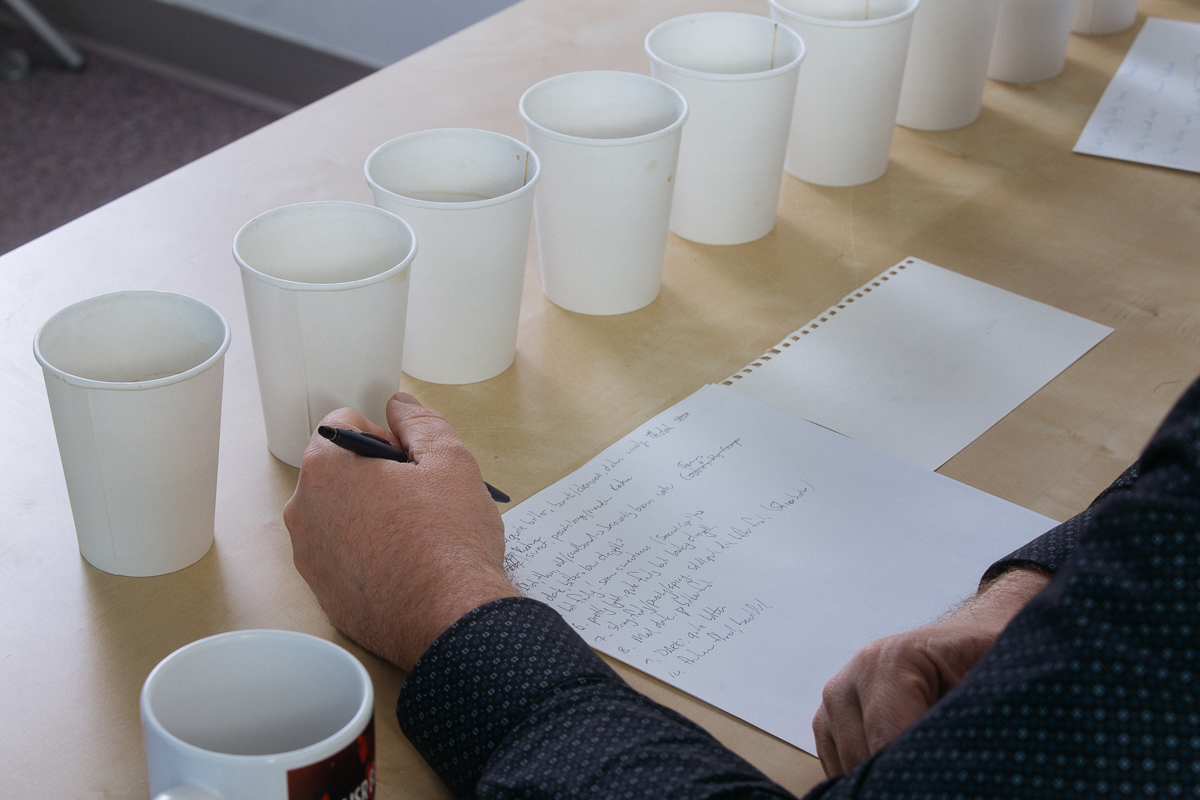
Tea & Coffee Company ($2.40)
Hockin: I found this coffee to be super bitter. There wasn’t a lot of depth to it. It just tasted like bitter dark chocolate and very woody. There was also sweetness and it had a medium-heavy body. It’s pretty strong.
Jeschke: I agreed mostly, I would also say that I found it really chalky and dry. My tongue just felt really dry afterwards.
Hockin: By “body,” I just means how heavy it feels on your tongue. So liken it to, what’s the difference between putting water on your tongue versus heavy cream on your tongue. It’s going to feel different. It tasted like it was a pretty low-quality coffee. I’m going to guess that this is Tim Hortons Dark Roast.
Jeschke: I was going to guess based on the darkness that it was Starbucks.
Sweets and Treats ($1.65)
Hockin: This one is not super dark but it’s still a little bit dark. It’s got some fruit flavour in it. It’s a bit sweet. It’s not terrible. If I was in a pinch, I would go here. I think this is Second Cup. It doesn’t have that telltale bitter acridness that Starbucks can have on the finish. Also Pike Place (Starbucks medium roast coffee) is typically more spicy than fruity, and this is more fruity.
Jeschke: I found it flat and kind of stale. And I mean this in a positive way to some of the other ones—it was inoffensive and it was sweet. So I agree with Hockin, I would drink it in a pinch as well.
Hockin: Pretty not bad.
Jeschke: Aggressively not bad.
The Daily Grind ($2.55)
Hockin: This coffee is from Ethiopia. Or it has Ethiopia qualities for sure. I can almost always tell that a coffee is from Ethiopia as long as it’s a high-quality coffee. And that’s actually to do with the fact that coffee actually comes from Ethiopia. Rather than it being the product of limited seed stock moving around the world and having a limited genetic pool of flavour, it has thousands of years of natural growth and mutation in Ethiopia. So it’ll taste a little bit floral, and it’s going to have a tiny bit of a lemony or lemon-peel flavour. And those qualities really distinguish a coffee from Ethiopia. My guess is that this one is probably from the Daily Grind.
Jeschke: Yeah, I found this one confusing because, right away, I knew it was Ethiopia. And that’s what we brought along. But it’s stronger than ours would be. It’s really syrupy and really sweet.
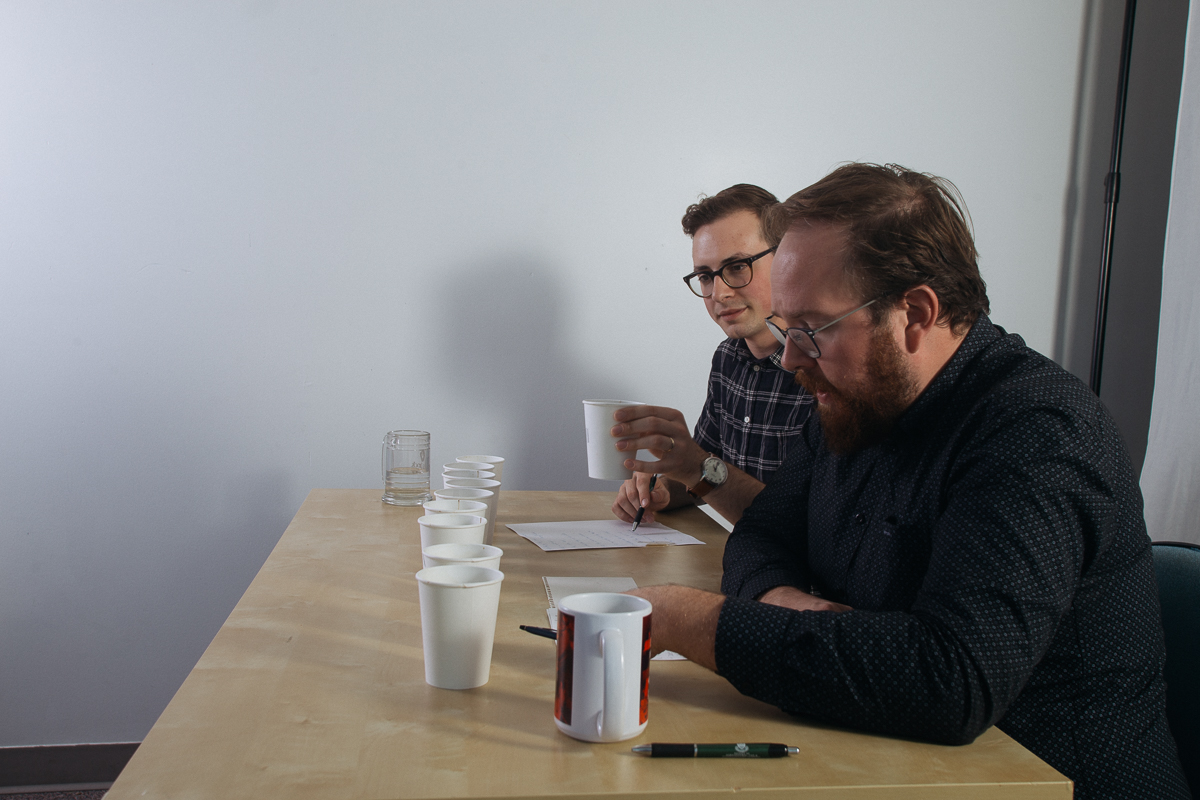
Second Cup ($2.40)
Hockin: When it was hot, I found it quite strong and kind of punchy and spicy. A slightly bitter finish. Now that it’s cool, I feel like I’m losing my mind a little bit. Not that dark, not that strong. This could be Tea & Coffee Company.
Jeschke: One of the side effects of tasting alot of coffee is that as you go along, you get progressively crazier. What we always do is drink some matcha. It actually works.
Hockin: I eat the powder.
Starbucks ($2.45)
Hockin: That is dark. Ugh. This coffee is nothing but charcoal to me.
Jeschke: I thought I could taste some fruit and some sweetness in it, but it was very dark.
Hockin: Terrible.
Jeschke: Ashy.
Hockin: That is not a medium roast. Whoever is calling that a medium roast is lying. Maybe it’s the Tim Hortons dark roast. One of the telltale signs that a coffee was either harvested or roasted way too long ago is that it tastes like paper or cardboard. Some of the flavour might come from the paper cup to be honest, but this is not like that. This is cardboard.
Transcend Chelelektu ($3.25)
Hockin: It’s a tasty coffee. I get lemony-limy citrus, pineapple, bit of a stone fruit — maybe a plum or an apricot. It’s quite floral. There’s something savoury on the finish. Like coriander seed. The longer finish is floral, like Jasmine.
Jeschke: I was really thrown by this one — it tasted fake to me after all the other ones. It’s like someone added sugar to it. It’s definitely Chelelektu.
Hockin: When we talk about the natural sweetness of coffee, it’s never going to taste saccharine — it’s never going to taste like there is pure sugar in there. There are more complicated sugars in coffee that are broken down from roasting. So when you roast a high-quality coffee fairly lightly, those sugars don’t get caramelized and burnt. So if you do it well, the coffee can be sweet.
Cookies by George ($2.35)
Jeschke: I thought it was bitter and dry, but it had some fruit to it.
Hockin: It just tastes flat to me. And stale. It’s not super bitter, but it’s pretty bitter. There’s a fog over it. Ugh.
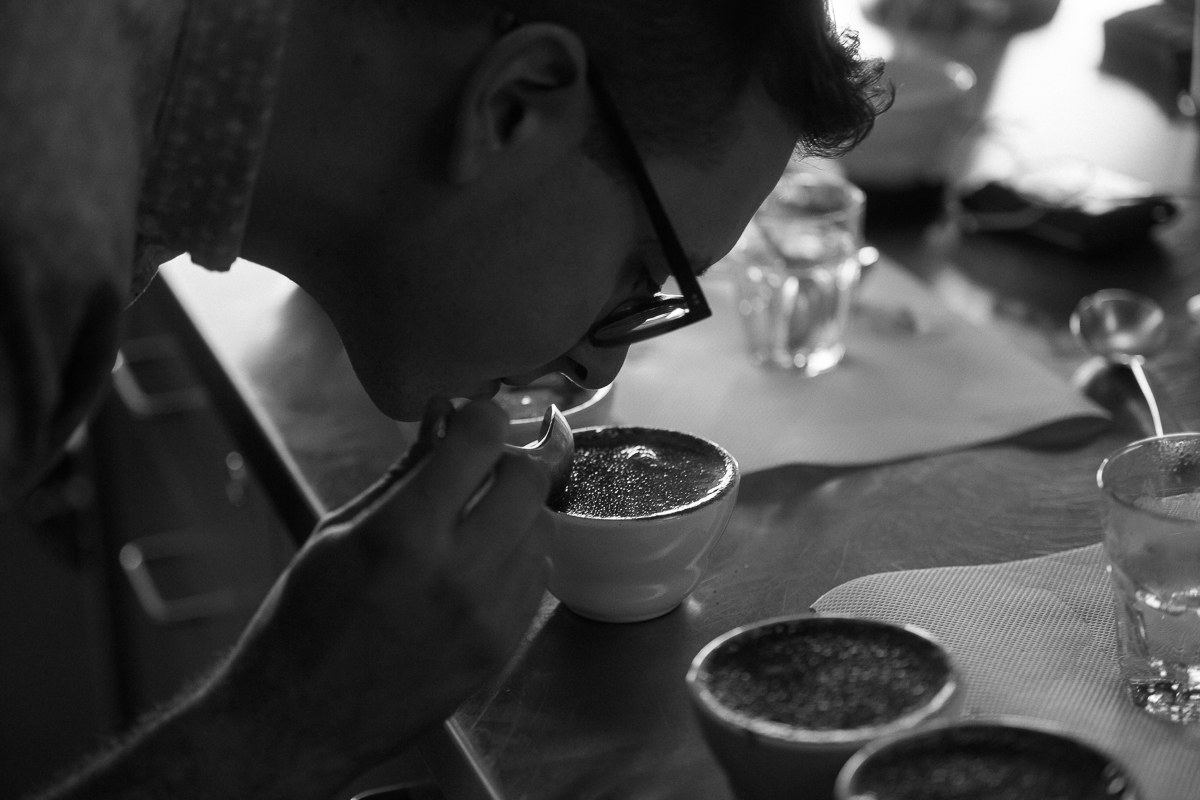
The coffee has been sniffed, sipped, and slurped. The results are in.
There are three conclusions to be made from the blind coffee taste. Firstly, the hidden gem of campus coffee is without a doubt Sweets and Treats. It looks mildly sketchy — sitting there unceremoniously in a thermos labelled by a piece of tape that says “coffee.” Who knows where it comes from or how long it’s been there. It’s best not to ask these questions because, at only $1.65 a cup, it’s by far the cheapest coffee the tasters reviewed and has been described by the coffee establishment as “aggressively not bad.” Sweets and Treats’ central location in HUB makes it an easy pick for students on the arts side of campus. Secondly, matcha tea is an indispensable coffee companion for those days when you regret drinking that extra-large double-double. The cure for the coffee shakes is only a cup of matcha tea away. Lastly, avoid Tim Hortons. But if tempted, go for the dark roast. And get it with extra cream.

